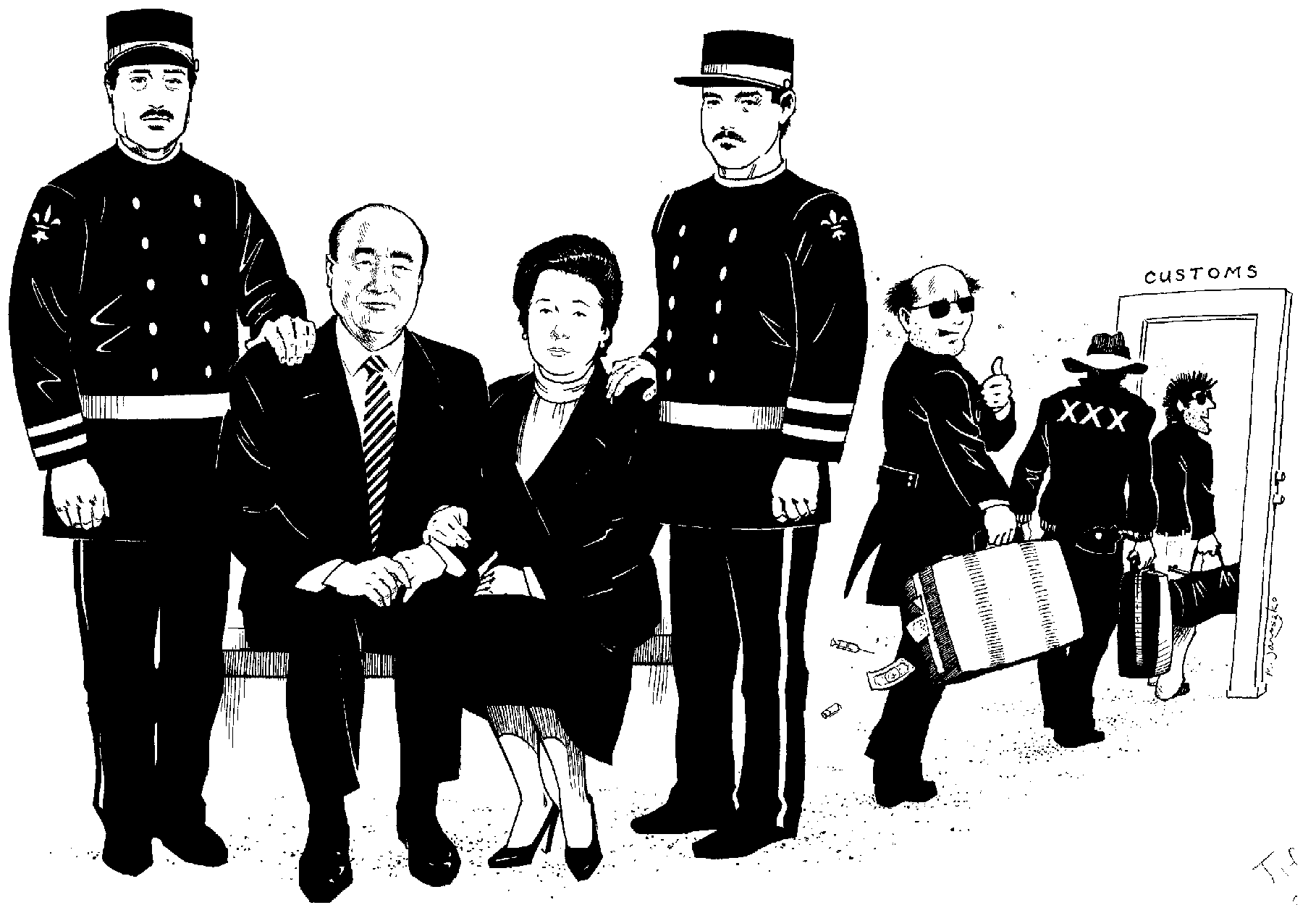![]()
Unification News for
![]()
March 1998
|
|
Unification News for |
|
|
|
March 1998 |
The Strange Case of Herr Moon
"Threat to Public Order," or Victim of Discrimination?
by Dan Fefferman
In Franz Kafka's novel The Trial, the protagonist Josef K. finds himself charged by unknown parties with an unspecified crime. He has no recourse but to accept his unjust fate and search within himself for the meaning of his predicament.

So it was with the Rev. and Mrs. Sun Myung Moon, founders of the Unification Church, as they sat detained by police in a French airport, forbidden to fulfill plans to visit their European followers.
Just a week previous, in November 1995, Rev. Moon had delivered a sermon to French supporters at a Paris hotel. Not only had his talk on salvation history come off without incident, he and Mrs. Moon had been given a full police escort from the airport to the hotel.
Now, a week later, they received a different sort of escort, not from Paris gendarmes, but from French immigration police. It turns out the Moons, who were not even attempting to enter France but only to change planes and proceed to Spain on another leg of their speaking tour, were now considered "dangerous persons."
The immigration agents separated the Korean couple, neither of whom speaks French, and kept them in custody of several hours. The Moon's were forbidden to continue on to Madrid and eventually forced to return to Budapest, where their flight had originated. Moreover, the immigration authorities pressured Rev. Moon several times to sign a document in French, which he declined to after they refused to provide a translation. It turns out the document would have promised that he would never again attempt to enter France.
The aging Rev. Moon and his wife were now "a threat to public order," having been listed as such by the government of Germany. The Germans carried out the action under provisions of the Schengen Treaty, which was designed to prevent terrorists and drug dealers from abusing liberalized European travel codes. The listing meant that the Moons were now effectively banned from Austria, Belgium, France, Italy, Luxembourg, The Netherlands, Portugal, and Spain.
Appealing the Decision
Church members in Europe found it hard to understand the ban. The invitation to their leader had been issued as part of a worldwide speaking tour, and his sermon-on a strictly religious theme-had previously been delivered without incident in sixteen cities of the United States and sixteen other nations. No notice had been given of the impending ban, and no charges specified, despite the fact that there had been no hint of trouble on the tour. The Moons had entered Germany on several previous occasions with no evident problems or complaints from authorities.
Attempts by church officials to appeal the ban have met with little success. In a particularly Kafkaesque episode, a law firm retained by the church in France filed an appeal and, after several months, was duly informed by a judge that the Schengen file on Rev. Moon was in order. The firm was not allowed to see the file or any of its contents and was thus unable to challenge its contents.
In litigation brought by the church in Germany, the church finally gained the right to examine the file on its spiritual leader, and claims it is full of outdated and inaccurate information, much of it from sources of dubious credibility. The German Federal Criminal Police acknowledge that there has been no prosecution of the church or its officials and affirms that the group is taking "meticulous care" to conduct itself lawfully.
Sources say the government believes that the Moon movement might become a neo-fascist political force. One wonders whether such fears, whether real or imaginary, justifies singling out the aging Korean preacher for shunning-not to mention his wife.
Church members say the ban has caused considerable hardship. They strongly deny the charge of fascism, declaring that the church supports democracy and constitutional guarantees of human rights. "The government is effectively denying members of the Unification Church the right to practice their religion and to associate with their religious leader, who is now quite elderly and may soon be physically unable to visit Germany," they say.
Holland, an Exception
One bright spot for church members has been the action of the government of The Netherlands, which took the unprecedented to step of granting Rev. and Mrs. Moon permission to visit Holland despite the Schengen ban against them.
The church also won a significant victory against the German government in June 1997, when a court prohibited the government from continuing the distribution of a booklet it had printed to warn German youth against the church. The court ruled that the booklet, 200,000 copies of which had been published by the Ministry of Family, Senior Citizens, Women and Youth, contained false allegations that "damage the honor" of the church.
The Unification Church is not the only small religious group to complain of shoddy treatment in Germany. The U.S. State Department has expressed official concern about Germany's treatment of Scientology, Jehovah's Witnesses and other non-traditional religious groups. In addition, the UN's Special Rapporteur on Religious Intolerance has recently expressed concern about Germany's behavior toward its religious minorities.
Meanwhile, Rev. Moon plans to launch another world speaking tour this year, in conjunction with his announced plan to bless the marriages of 360 million couples worldwide before the year 2,000. Church members say they hope that international pressure on Germany will stimulate the government to open its borders to their leader.
The author serves as executive director of the International Coalition for Religious Freedom. <<www.religiousfreedom.com>>
Download entire page and pages related to it in ZIP format
Table of Contents
Copyright Information
Tparents Home